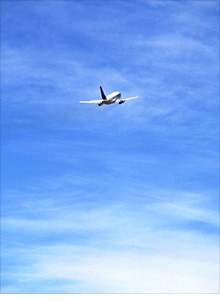Fear of flying
Entrepreneurship confers independence, but the psychic price can be steep.

(Fortune Small Business) -- The doors have closed and my seat belt is buckled tight. Flight attendants are rushing to close the overhead bins. I feel a lurch, and out the window I see the terminal recede as the plane taxis toward the runway. But I don't really notice any of this. My chest is pounding. My stomach is a churning pit - I'm nauseous. My shirt is drenched in sweat, and I can barely breathe.
That's how Nick Warner imagines himself flying. The real thing? Not gonna happen. Warner, 33, is a tech entrepreneur based in the Midwest. (I've changed his name and some biographical details to protect his privacy.) He creates visualization technology for computer users, and then assembles hives of code writers and businesspeople to develop and deploy it. Even though Warner is a successful entrepreneur, his fear of flying - aviophobia - is paralyzing. He's concerned that his business will eventually suffer if he can't travel to trade conferences and client meetings.
Warner has tried to conquer his fear of flying by using alcohol, antidepressants, anti-anxiety drugs, hypnosis, meditation and cognitive behavioral therapy. Nothing has helped. Realizing that aviophobia was affecting him both professionally and personally, Warner phoned me.
We met in his home office because, obviously, he wasn't going to get to mine in New York City. Flat-screen monitors surrounded us. Over the quiet whir of computer fans, I could hear his 11-month-old son playing in a nearby room. "The most upsetting thing is not being able to take him to Grandma and Grandpa's for Christmas," he told me.
"I feel bad that everybody else on the plane has to die too," he continued in a chillingly matter-of-fact tone. "It's not fair. They're innocent. I'm the only one who has to be punished." Why so? "I know the plane will crash because I'm not supposed to go," he explained. "I'm not allowed to go anyplace."
Phobias are exaggerated fears accompanied by avoidance behavior - not flying, in Warner's case. Psychiatrists typically classify them as a form of panic disorder. Common phobias include fear of public speaking, crowds and confined spaces. Of course, not every fear is a phobia. There's nothing irrational about occasionally feeling nervous in the air, even though the risk of disaster is statistically minuscule.
But Warner's fear goes way past planes falling from the sky. For him, flying is a punishable offense. That's an important clue in discovering the roots of his phobia. Like many entrepreneurs, Warner was drawn to both the challenges and rewards of starting and running his own business: no boss, lots of responsibility, full accountability, setting and exceeding self-appointed goals. Entrepreneurship seemed like the epitome of independence.
Nice work if you can get it. But this type of freedom has a counterpart - psychological independence - that's more complicated to achieve. It's not just a matter of having a life on your own or a mind of your own. It's also about shedding fears and inhibitions.
A common misconception is that bad mothers lie at the root of most psychological problems, but in Warner's case it happens to be true. When he was growing up, his mother was needy, intrusive and self-involved. To this day, Warner lives as though he were tethered to her - this doesn't fully explain his personality, but it's a central code sequence in his operating system. (To be clear, this relationship exists mainly in his mind. In reality, Warner and his mother live far apart and speak only occasionally.)
As an adult, Warner is haunted by the fear that his mom can't survive without him. When he tries to mentally distance himself - something flying represents more vividly than any other mode of transport - images of his mother's distress snap him back. Result: His flight (think airplanes and fleeing) is canceled. Hence his phobic vision of crashing planes and innocent victims.
Warner's cure won't come overnight, but there's cause for optimism. By taking action and getting help, this dynamic entrepreneur has already shown that he's got the right stuff. Every pilot learns in a flight simulator, a safe place to practice landing and taking off.
Alexander Stein, Ph.D., is a practicing psychoanalyst in New York City and a principal in the Boswell Group, a consulting firm. ![]()
-
The Cheesecake Factory created smaller portions to survive the downturn. Play
-
A breeder of award-winning marijuana seeds is following the money and heading to the U.S. More
-
Most small businesses die within five years, but Amish businesses have a survival rate north of 90%. More
-
The 10 most popular franchise brands over the past decade -- and their failure rates. More
-
These firms are the last left in America making iconic products now in their twilight. More









